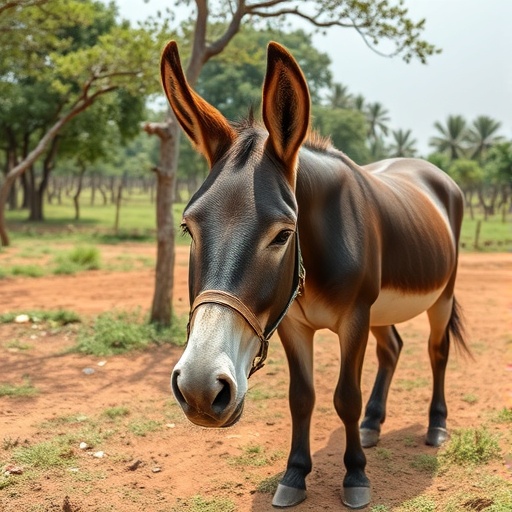In the expansive pastel-hued landscapes of Kenya, the interaction between humans and working donkeys is profound and multi-dimensional, influencing both the welfare of these animals and the livelihoods of those who rely upon them. A groundbreaking study conducted by J.M. Kithuka, T.M. Wachira, and J.O. Onono delves into the environmental factors and human practices that shape the lives of these often-overlooked animals. By focusing on the nuances affecting donkey welfare, this research has broad implications for agricultural practices, animal welfare policies, and the sustainable management of animal services in Kenya.
Exploring the core tenets of their inquiry, the researchers embarked on a meticulous analysis of how various environmental factors impact the physical and psychological well-being of working donkeys. This includes studying the animals’ living conditions, access to food and water, as well as their social interactions with both humans and other animals. In Kenya, where donkeys play an integral role in transport and agricultural work, their welfare directly correlates with the efficiency of rural economies. The team gathered data from a variety of sources, including direct observations, surveys with local owners, and community interviews, which collectively paint a comprehensive picture of donkey realities in Kenya.
At the heart of this research is an exploration of the physical environment afforded to these animals. Their findings indicate that adequate shelter is a pivotal factor influencing the overall health of donkeys. Lack of proper shelter exposes these hardworking creatures to extreme weather conditions, leading to a spectrum of health-related issues. The study demonstrates that donkeys without adequate protection from the elements suffer from higher instances of stress and related health issues, which can drastically affect their ability to perform labor.
Water scarcity is another critical factor highlighted in the research. In many regions of Kenya, access to clean and sufficient water sources is extremely limited, which directly impacts the hydration and nutritional status of working donkeys. The researchers emphasize the necessity of nearby water sources to ensure that donkeys remain hydrated, which is essential for their stamina and overall performance in labor. This study indicates that implementing water access programs could markedly improve donkey welfare and thereby service productivity.
Additionally, the social dimensions of donkey welfare cannot be overlooked. The research illustrates that donkeys often develop strong bonds with their handlers and surrounding animals, which can play a significant role in their emotional welfare. The study also addresses the human-animal interactions, asserting that positive engagement between the handlers and donkeys foster a better working environment. Instances of neglect or abuse have adverse effects, inducing stress and anxiety in the animals. Therefore, training for handlers in humane treatment practices has been recommended, representing a crucial facet of animal welfare enhancement.
Furthermore, socio-economic elements are interwoven with donkey welfare, as the researchers reveal how socioeconomic status of donkey owners directly correlates with the level of care afforded to these animals. Rural households with limited financial means often struggle to provide basic necessities for both their families and their donkeys, leading to an inherent cyclical disadvantage. The study advocates for targeted initiatives that could support low-income families, thereby elevating the health of donkeys while simultaneously improving the livelihoods of their human counterparts.
Another significant aspect brought to light in this research is the health risks that working donkeys may face due to poorly controlled breeding practices. The investigation into breeding management revealed that many donkey owners lack formal training in the optimal breeding practices. Consequently, genetic issues and health complications arise, which can perpetuate overall welfare concerns within the local donkey population. The study stresses the importance of educational programs that address reproductive health and responsible breeding practices.
Beyond health and environmental factors, the cultural significance attached to donkeys in Kenya also receives attention. The donkey is often synonymous with hard work and resilience in various communities, yet misconceptions about their ability often undermine their welfare. There is a pressing need for public awareness campaigns to reshape the narrative surrounding donkeys, focusing on their intelligence and emotional capacity. Such initiatives could foster a shift in perspectives, leading to enhanced treatment and care for these animals.
An essential recommendation stemming from this research is the need for policy reform in animal welfare standards, specifically tailored to address the unique needs of working donkeys. The study advocates for improved legislation that provides comprehensive guidelines on the ethical treatment of working animals, thereby ensuring their welfare is prioritized at all levels of policy-making. This includes both local and national governments, as a collaborative effort could significantly elevate standards of living for both donkeys and their handlers.
In conclusion, the findings presented by Kithuka and his colleagues are an enlightening call to action. By explicitly linking environmental factors and human practices to donkey welfare, this study lays the foundational framework for interventions that could transform the lives of these vital working animals in Kenya. It compels stakeholders—ranging from local governments to international organizations—to re-evaluate strategies concerning animal welfare and community support initiatives. The ultimate goal remains not just to enhance donkey health but to uplift the livelihoods that depend on their labor.
As the narrative surrounding working donkeys in Kenya continues to evolve, it is hoped that this research will catalyze a broader movement toward improved welfare standards. Engendering a holistic understanding of their needs and the challenges they face is essential. This study underscores that the journey toward better treatment begins with advocacy, education, and informed practices, ensuring a more humane future for these indispensable creatures.
Subject of Research: Environmental factors and human practices affecting the welfare of working donkeys in Kenya.
Article Title: Assessing environmental factors and human practices on the welfare of working donkeys in Kenya.
Article References:
Kithuka, J.M., Wachira, T.M., Onono, J.O. et al. Assessing environmental factors and human practices on the welfare of working donkeys in Kenya.
Discov Anim 2, 25 (2025). https://doi.org/10.1007/s44338-025-00073-y
Image Credits: AI Generated
DOI: 10.1007/s44338-025-00073-y
Keywords: Working donkeys, welfare, Kenya, environmental factors, human practices, agriculture, animal health.




